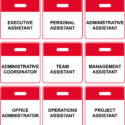
Claire Rothwell explains why acceptance is key to getting the best from your brain
An estimated one million women in the UK are living with undiagnosed ADHD, leading to health issues including anxiety, depression, and obesity and contributing to problems with employment.
Until last year, I was one of them. Before my diagnosis, I was stuck in a regular cycle of throwing myself into new Assistant roles, getting great results, feeling unfulfilled when I’d achieved what I’d set out to, and moving on to the next challenge.
When I joined the Pink Spaghetti network of Virtual Assistants in the UK, I already knew that some of the owners we support are neurodivergent. So, when I received my own diagnosis, I understood ADHD wasn’t incompatible with being successful. However, I did question how I could put myself forward as being an expert in keeping people organised when I had a condition synonymous with being the opposite.
But a long process of reflecting, talking, and reading has helped me understand that my brain isn’t defective, it’s just different. I now know that having ADHD isn’t incompatible with being an Assistant – in fact, I think it makes me better at my job.
Ignore the Stereotypes
ADHD often goes undiagnosed because of dated and incorrect stereotypes: that it mainly affects boys and children, or that those affected are disruptive with a short attention span. Given its full name (attention deficit hyperactivity disorder), this isn’t surprising. But it’s a misnomer – many people don’t have a deficit of attention, they have too much.
While there are certainly children who present with the classic external signs, there are three types of ADHD (inattentive, hyperactive-impulsive, and combined), each with a wide variety of symptoms. The hyperactive element isn’t necessarily physical; it can present itself as racing and jumbled thoughts, or a brain that won’t switch off. And, rather than being disorganised, common ADHD traits such as noticing small details and working well under pressure translate to high levels of efficiency.
These skills and more are all integral to my own professional repertoire, and they’ve enabled me to progress in a 17-year career as an Executive Assistant, account manager, and now VA with a varied client list.
I have had to make adjustments, and there’s been a lot of trial and error in identifying what works best for me. But everyone has their own way of working, and for people with ADHD it’s no different. The key is in acknowledging and accepting that our brains are wired differently (the differences are visible on scans) and using it to our advantage.
1. Have Confidence in Your Own Abilities
Gender stereotypes mean that boys with ADHD often get cut a lot more slack than girls, so women in particular tend to develop high levels of masking from an early age. This can lead to a lifetime of self-doubt and second guessing, resulting in anxiety and stress.
While we can’t change the way the brain is made, we can alter its neural networks (a process known as neuroplasticity) and train it to recognise what we do well instead of focusing on what we don’t. Do you see small details where others focus on the bigger picture? Are you great at meeting deadlines, while colleagues prefer to plan? All are valid skills.
Recognise and acknowledge your positive contributions and let them take up the brain space they deserve. As the old saying goes, if a fish judged itself on its ability to climb a tree, it would think itself to be a terrible fish.
2. Be Honest About Your Intentions
A common trait of neurodivergence is the need to find out as much as possible about a topic of interest. This means we can very quickly produce relevant information – it also means we can struggle to focus on what we’re doing if we don’t understand why we’re doing it.
When I take on a role or task, I want to soak up as much knowledge as possible so I can see how my contribution fits in. I have to understand the bigger picture so I can light that spark that fires me up and makes my brain produce norepinephrine – the neurotransmitter and hormone that ADHD brains naturally have less of.
Rather than struggling in silence, I’ve learned to explain what I need in order to do a better job: “Can you give me the background for this? If I understand the process and what your end goal is, I can see where I fit in and offer a better perspective.” Or “What’s the career development plan for this role? What am I working towards?”
Being honest about intentions doesn’t just help you to focus, it shows an active interest that will ultimately benefit the project or company.
3. Set Yourself Boundaries
Rejection sensitive dysphoria (RSD) is a condition associated with the ADHD brain structure that can trigger debilitating symptoms in the face of rejection or failure (real or perceived). This is why people-pleasing tendencies are common in people with ADHD and make it hard for us to say no or let people down. It also means we’re incredibly reliable.
Setting healthy boundaries is much easier said than done, and it’s something I know I will always struggle with. But I have learned a compromise: rather than say no to other people, I say yes to myself.
This means giving myself the space I need to be productive – turning my phone off for an hour or two, closing down the email app to allow me to finish a task without constantly switching between windows, or blocking out chunks of time in my schedule so people can’t add me to meetings. And if I’ve made a commitment, I will always stick to it, so I turn this to my advantage by making firm plans with friends and family. If it’s in the diary, it will happen!
4. Manage Expectations
Many people with ADHD experience time blindness. It’s often joked that we only have two times: now and not now. This is directly related to how our brains work and has nothing at all to do with being lazy, disorganised, or disinterested. Rather, it’s linked to lower levels of activity in some areas of the brain, including the prefrontal cortex (responsible for high-level cognitive functions, including planning) and the different way the neurotransmitter dopamine works.
Dopamine is crucial for regulating attention and also plays a major role in the brain’s reward system. It means that to fire up our prefrontal cortex and trigger the release of dopamine, we need a real incentive (or consequence). It’s why we work so well under pressure. It’s also why “whenever you can” is the absolute worst thing anyone can say to me when I ask for a deadline. Giving myself the deadline won’t work: my brain knows it’s fake, and the process it needs to get into gear won’t be triggered.
Managing other people’s expectations is crucial to ensuring your brain will work as you want it to. Insist on a deadline, be honest if it’s unrealistic (time blindness also tricks us into thinking we can do much more than is possible in the time we have), deliver as promised – and enjoy the reward of the dopamine rush.
5. Hyperfocus Is Not a Superpower
Hyperfocus is also linked to dopamine dysregulation. When we find something we’re truly interested in (or there’s an external trigger such as a deadline or emergency), our dopamine levels surge and we become so absorbed we don’t notice anything else. We forget to eat, work through the night, or binge-watch all the episodes of a new series in a single stretch.
Hyperfocus is what makes people with ADHD work extremely well under pressure. When we perceive a threat (such as a tight deadline that absolutely can’t be missed), the surge of dopamine is doing exactly what it’s supposed to – keeping us safe by triggering the ‘fight or flight’ response. It’s not so useful, though, when we stay awake all night to finish a book even though we’re vaguely aware the alarm will go off in an hour.
There’s lots of advice online about how to harness the benefits of hyperfocus. It’s not something I’ve ever managed to do. However, like all the other traits I have that I now know are due to the physical make-up of my ADHD brain, it’s something that I’ve accepted.
If there’s one thing that I’d like you to take away from this article, it’s to accept the way your brain works. Don’t be afraid to find your own routine and politely ignore well-meaning advice. Embrace your individuality, focus on your strengths – and stop being a fish trying to climb a tree.













